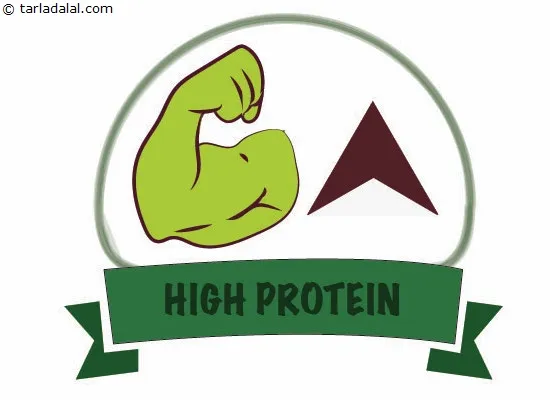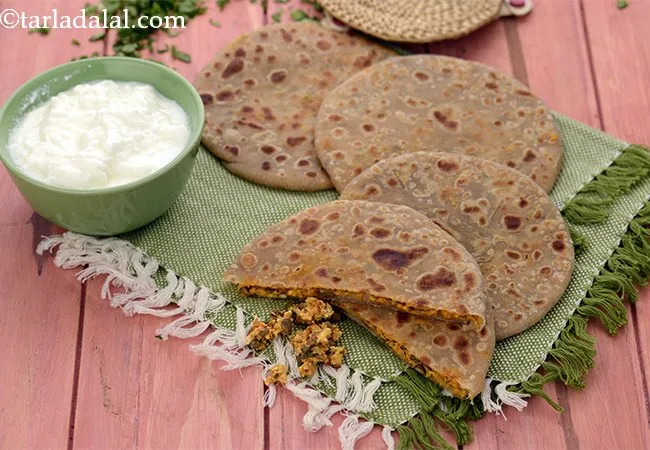Search & Articles
Search from thousands of articles from sabzi, roti, chawal, dal, paneer, Indian recipes to health articles.
Masoor Dal Benefits, Masoor Benefits

Masoor Dal benefits, Masoor Benefits
Table of Content
Superb Health Benefits of Masoor / Masoor Dal + healthy Indian masoor dal recipes + whole masoor recipes
Masoor is one of the most commonly used lentils in Indian kitchens, with colour ranging from yellow to reddish orange to even brown and black. It’s split version is termed as Masoor dal. Basically split lentil means without skin and is orange in colour. It is an important part of the diet in many parts of the world, especially in the Indian subcontinent, which has a large vegetarian population. While it’s best suggested to soak masoor before cooking, the masoor dal does not need soaking prior to cooking as it is a soft dal and cooks quickly. When cooked, masoor dal turns a soft golden colour and has a pleasant earthy flavour. With 26 per cent protein, these lentils have the third-highest level of protein, by weight, of any plant-based food after soybeans and hemp.
Here are 10 reasons why you should include masoor and its dal in your diet.
Masoor dal is rich in Vegetarian Protein:
Masoor dal, commonly known as red lentils, stands out as a highly valuable source of vegetarian protein, making it a cornerstone in plant-based diets across India and beyond. On average, 100 grams of cooked masoor dal can provide approximately 8-9 grams of protein, and raw masoor dal can boast up to 24-25 grams of protein per 100g, making it one of the richest plant-based protein sources among legumes. This significant protein content is crucial for various bodily functions, including muscle repair and growth, enzyme and hormone production, and overall cellular maintenance.
While many plant-based proteins are often classified as "incomplete" because they may lack one or more of the nine essential amino acids our bodies can't produce, masoor dal is relatively well-balanced in its amino acid profile compared to some other plant sources. For vegetarians, pairing masoor dal with a grain like rice or whole wheat roti creates a "complete protein" meal, ensuring the body receives all necessary essential amino acids. This makes masoor dal an incredibly versatile and economical choice for meeting protein requirements, supporting satiety, and contributing to overall health and well-being within a vegetarian diet.
1 cup of cooked Masoor dal gives 19 grams of protein which is 31% of the total daily recommendation of protein for an adult man.
Paneer Masoor Paratha is a classic example which combines 2 sources of protein – protein and masoor dal.
Masoor dal Keeps your bones and teeth healthy:
Masoor dal contains notable amounts of calcium, phosphorus, and magnesium, all of which are vital for building and maintaining strong bones and teeth. Regular consumption of these minerals helps maintain bone density, promotes healthy growth and development, and can reduce the risk of bone-related problems like osteoporosis as one ages.

masoor dal and paneer soup recipe | masoor dal soup for weight loss | healthy dal paneer soup is a delicious protein boost. Enjoy it piping hot.
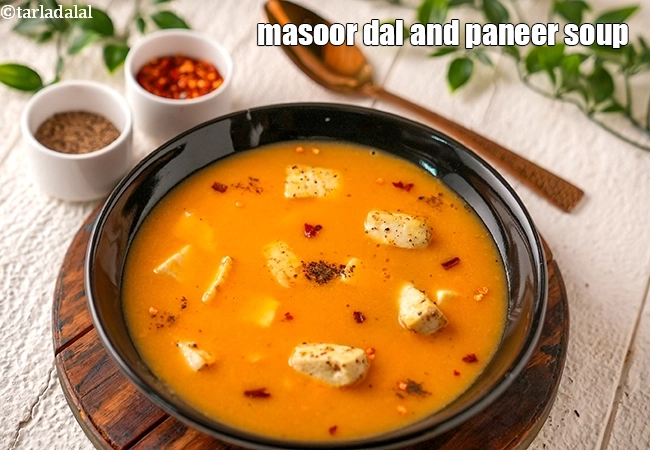
Whole Masoor and Masoor dal Aids in weight-loss:
Both whole masoor (brown/black lentils with skin) and masoor dal (split red lentils without skin) are highly beneficial for weight loss due to their exceptional nutritional profiles. They are rich in dietary fiber and protein, two key components that promote satiety. The high fiber content adds bulk to your meals, making you feel fuller for longer and reducing the likelihood of overeating or unhealthy snacking. Simultaneously, the abundant protein helps to curb appetite and preserve muscle mass during weight loss, contributing to a more effective and sustainable reduction in overall calorie intake. While whole masoor has slightly more fiber due to its intact skin, both forms offer significant benefits for managing hunger and supporting a weight-loss journey.
Chawli Masoor Dal is a flavourful way of adding masoor dal to your meals. It is low in fat and high in protein and will help you to gain muscles.
chawli masoor dal recipe | healthy amaranth leaves dal with lentil | Indian chaulai dal
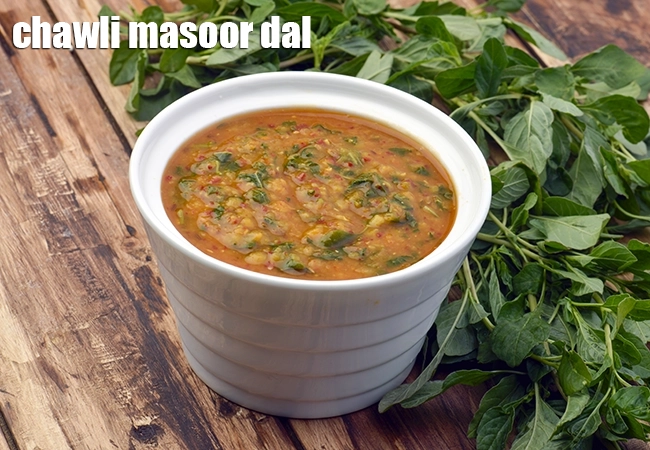
Masoor dal rich in folate | good for pregnancy
Masoor dal is an excellent source of folate (Vitamin B9), a naturally occurring B vitamin crucial for numerous bodily functions. Folate is vital for DNA synthesis, cell division, and the production of red blood cells and white blood cells, making it especially important for overall growth and development, particularly during periods of rapid cell division like pregnancy. Adequate folate intake helps prevent neural tube defects in newborns and supports healthy fetal development. While folate is the natural form found in foods, masoor dal provides a significant amount of this essential nutrient, contributing to cellular health, preventing certain types of anemia, and supporting vital metabolic processes within the body.
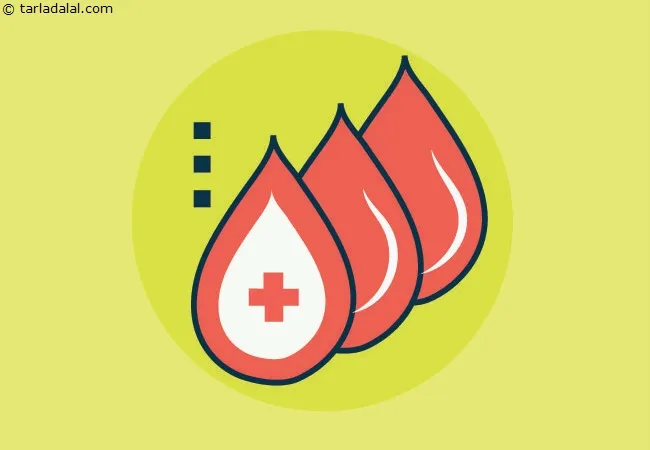
Masoor is rich in Folate, Vitamin B9 or Folic Acid which helps your body to produce and maintain new cells, especially red blood cells.
masoor dal and vegetable khichdi recipe | tadkewali masoor dal khichdi | Bengali masoor dal khichuri | healthy masoor dal khichdi is a one dish meal which is sure to satiate you and make up for many nutrients.
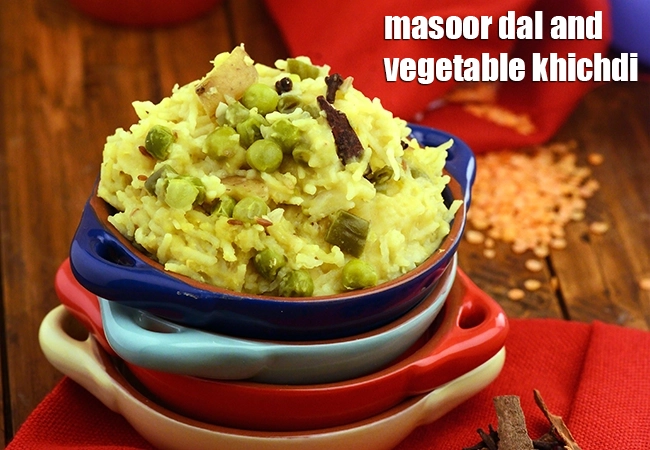
Masoor dal Good for Vision and Eye Health:
Masoor dal contains eye-friendly nutrients such as Vitamin A and antioxidants like lutein and zeaxanthin. These nutrients are essential for maintaining healthy vision and protecting the eyes from oxidative stress. Regular intake may help prevent age-related macular degeneration, cataracts, and other eye-related disorders, contributing to long-term eye health.

Masoor dal good for diabetes:
Masoor dal (red lentils) is an excellent choice for individuals with diabetes due to its low glycemic index (GI), typically ranging from 25 to 39, and its rich dietary fiber content. This low GI ensures that the carbohydrates are digested and absorbed slowly, leading to a gradual and controlled increase in blood sugar levels rather than sudden spikes. The abundant fiber, both soluble and insoluble, further aids in this by slowing down glucose absorption in the gut, improving insulin sensitivity, and contributing to better overall glycemic control, making it a highly beneficial legume for diabetes management.
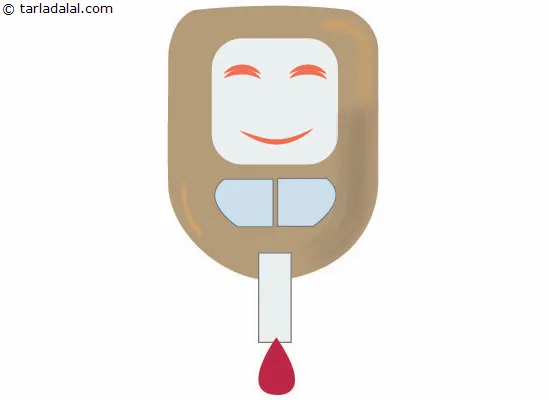
Try the East Indian version of dal – Bengali masoor dal recipe | mushurir dal | peyaj diye masoor dal
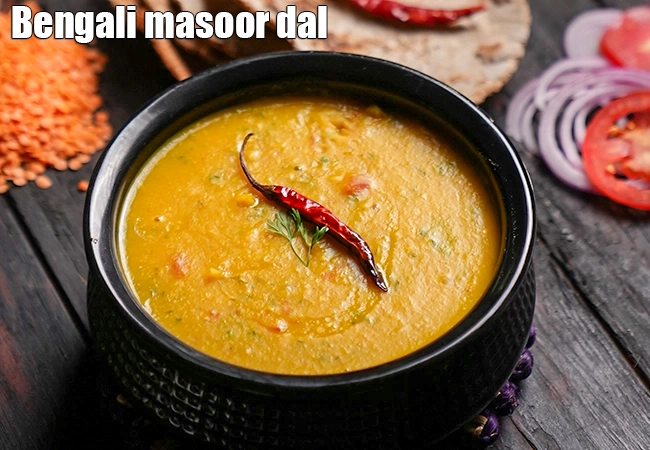
Masoor dal good for for heart:
Masoor dal is highly beneficial for heart health thanks to its potent combination of soluble fiber, potassium, and magnesium. The soluble fiber actively helps to lower LDL ("bad") cholesterol levels by binding to cholesterol in the digestive tract, preventing its absorption and aiding in its excretion from the body. This significantly reduces the risk of plaque buildup in the arteries. Furthermore, the presence of potassium and magnesium is crucial for maintaining healthy blood pressure; potassium counteracts the effects of sodium, while magnesium promotes the relaxation of blood vessels. Together, these nutrients contribute to improved blood flow, reduced strain on the heart, and overall cardiovascular wellness.
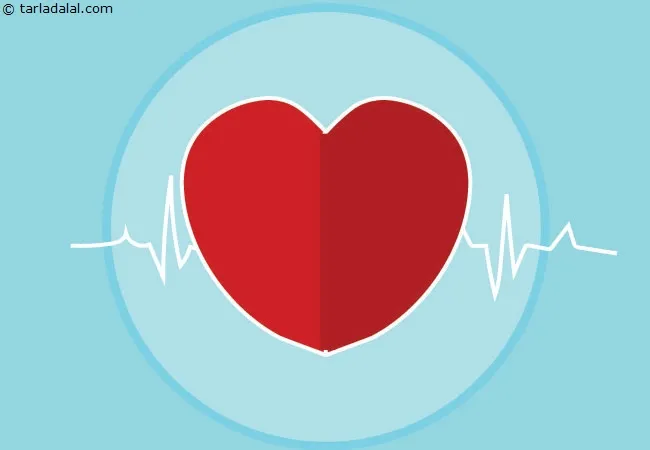
Hearty Red Lentil Soup | Indian style red lentil vegetable soup | heart friendly red lentil soup for weight loss is just perfect as its name.
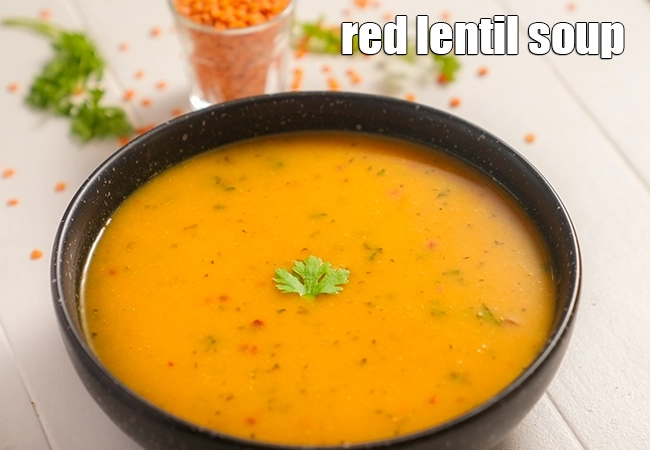
Masoor Dal is iron rich:
Masoor Dal is indeed a good source of iron, making it a valuable food for preventing iron deficiency and related conditions like anemia. A 100-gram serving of raw masoor dal can provide a significant amount of iron (around 7-7.5 mg), contributing substantially to your daily requirements. Iron is a critical mineral needed for the production of hemoglobin, the protein in red blood cells that transports oxygen throughout the body. While the iron in plants like masoor dal is non-heme iron, which is absorbed less efficiently than heme iron from animal sources, its consistent inclusion in the diet, especially when paired with Vitamin C-rich foods (like a squeeze of lemon juice in your dal), can greatly enhance its absorption.
1 cup of cooked Masoor dal gives 5.77 grams of iron which is 27.47% of the total daily recommendation of iron for an adult.
Masoor Dal and Palak Khichdi| masoor dal khichdi | split red lentil khichdi A serving of this khichdi makes up for 10% of your day’s requirement for iron.
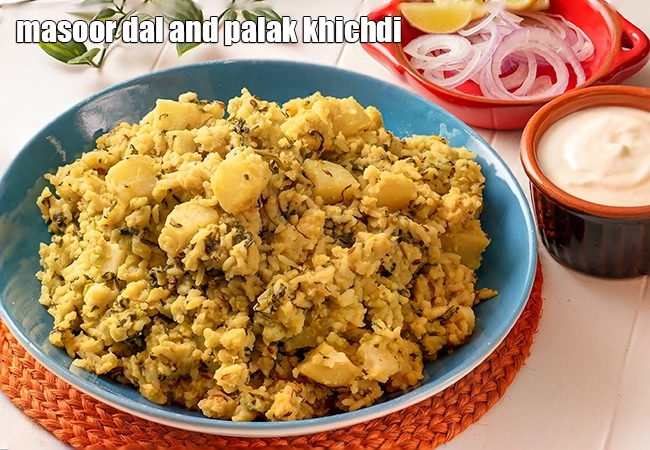
Masoor dal good for skin:
Masoor dal is highly regarded in traditional skincare and offers several benefits for skin health. Its fine texture, especially when ground, makes it an excellent natural exfoliator, helping to gently remove dead skin cells, impurities, and excess oil, revealing smoother and brighter skin underneath. Beyond exfoliation, masoor dal is rich in essential nutrients like proteins, vitamins (including B-complex), and minerals (like iron and potassium), which nourish the skin. It possesses anti-inflammatory properties that can help soothe irritated skin and reduce redness, making it beneficial for those with acne or sensitive skin. Furthermore, its antioxidant content helps combat free radicals, contributing to anti-aging effects and promoting a more even and radiant complexion.

Suva Masoor Dal | zero oil shepu dal | healthy masoor suva dal which makes use of minimal spices is truly worth a try!
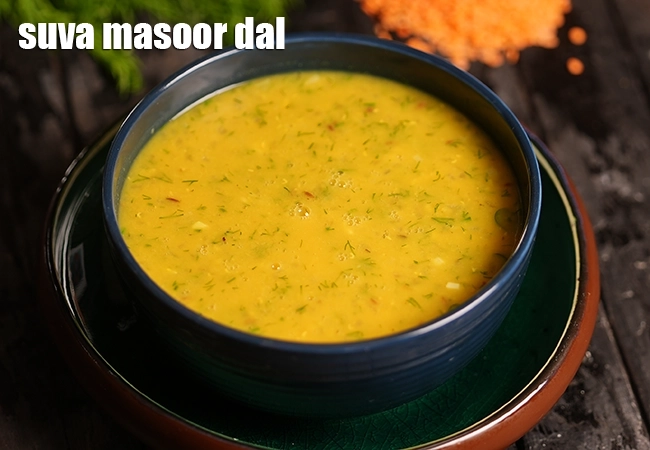
Masoor dal is Rich in zinc:
Yes, Masoor Dal (red lentils) is a good source of zinc, an essential trace mineral vital for numerous bodily functions. A 100-gram serving of raw masoor dal can provide a notable amount of zinc (around 2.35 mg, according to some sources), contributing to your daily requirements. Zinc plays a crucial role in supporting the immune system, aiding in wound healing, contributing to DNA synthesis, and maintaining the senses of taste and smell. Its presence in masoor dal makes this legume a valuable dietary inclusion for ensuring adequate zinc intake, particularly for vegetarians and vegans who might otherwise have limited sources of this important mineral.
Masoor dal is rich in zinc and gives 27.47% of the total daily requirement of zinc per 1 cup of cooked masoor dal.
Try combining it with a few veggies to create the magic of Masala Masoor Dal with Vegetables | mixed vegetable masoor dal | Indian masoor dal
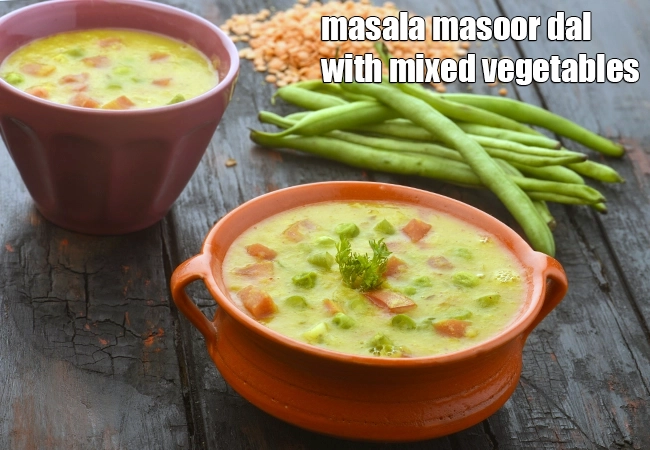
Nutrition Information for Masoor Dal
Nutritional Information for One cup of cooked Masoor Dal One cup of cooked Masoor Dal is 160 grams and comes from 76 grams raw Masoor Dal.
RDA stands for Recommended Daily Allowance.
260 Calories
19 grams of Protein
44.84 grams of Carbs
0.53 grams of Fat
See full nutritional details of masoor dal in Masoor Dal glossary click here.
healthy masoor dal recipes
healthy masoor dal Indian recipes. For toddlers, we have masoor dal water. Enjoy regular masoor dal recipe, massor dal with vegetables for a heavier meal. Pair it with ragi roti or bajra roti. For variations there is palak masoor dal and chawli masoor dal. In soups, we have the healthy masoor dal soup. See here for 137 masoor dal recipes.
healthy whole masoor recipes
Diabetics can try recipes like Nourishing Barley Soup. These slow energy burning lentil will help to maintain blood glucose levels. If you are targeting weight loss and looking for a Salad bowl, our recipes like Vegan Healthy Lunch Salad and Kale Masoor veg Antioxidant Office Salad. As a one meal dish, Paneer Masoor Paratha with a bowl of raita would serve the purpose and for healthy subzis opt for Masala Masoor and Mixed Pulses with Vegetables. And on days when you want to serve a healthy protein rich delicacy to kids, try tempting snack like Mint and Masoor TIkkis or sometimes even simple Whole Masoor Dal might look tempting to them.
akkha masoor dal recipe | kolhapuri style akkha masoor | akkha masur sabzi
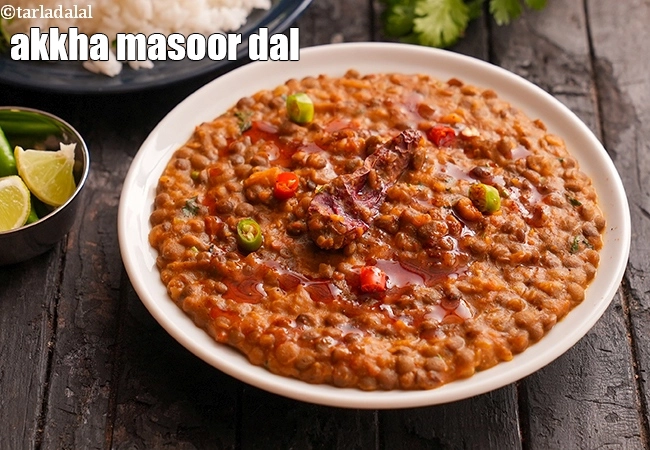
Recipe# 2577
15 June, 2021
calories per serving
Recipe# 2133
26 November, 2020
calories per serving
Recipe# 7287
30 December, 2022
calories per serving
Kale, Masoor Veg Antioxidant Healthy Office Salad More..
Recipe# 7378
13 January, 2023
calories per serving

Related Articles
Follow US
Recipe Categories
- Vitamin B12 Cobalamin Rich 35 recipes
- Low Calorie, Weight Loss Indian 423 recipes
- Low Cholesterol Indian 315 recipes
- Healthy Indian Breakfast 374 recipes
- Indian Diabetic 565 recipes
- Indian Pregnancy 461 recipes
- Zero Oil Indian 133 recipes
- Iron Rich Indian 268 recipes
- Healthy Indian Acidity 137 recipes
- Healthy Sabzi 108 recipes
- Healthy Indian Vegetarian Snack 276 recipes
- Healthy Heart 421 recipes
- Healthy Indian Vegetarian Soups 74 recipes
- Calcium Rich Indian 373 recipes
- High Blood Pressure Indian 104 recipes
- Healthy Indian Salads 137 recipes
- Low Carb Indian Diet 163 recipes
- Hypothyroidism Diet 63 recipes
- Arthritis Diet 68 recipes
- High Protein Indian 95 recipes
- Vitamin K Diet 42 recipes
- Fatty Liver Diet 39 recipes
- PCOS 136 recipes
- Gluten Free Veg Indian 197 recipes
- High Fiber 329 recipes
- Indian Cancer Patients 275 recipes
- Jaundice Diet 45 recipes
- Sprouts 61 recipes
- Typhoid 43 recipes
- Irritable Bowel Syndrome (IBS) 23 recipes
- Kidney Stone Diet 10 recipes
- Home Remedies 213 recipes
- Senior Citizen 195 recipes
- Healthy Indian Drinks and Juices 214 recipes
- Diet for Dialysis 10 recipes
- Gout Indian Recipes 17 recipes
- Potassium Rich 80 recipes
- Vegan 195 recipes
- Indian recipes to treat Vomiting 8 recipes
- Forever Young Diet, Anti Aging Indian Diet 255 recipes
- Antioxidant Rich Indian 445 recipes
- Vitamin B1 Rich Indian Foods, Recipes 101 recipes
- High in Omega 3 Fatty Acids 32 recipes
- Zinc Rich Foods 55 recipes
- Vitamin A Rich, Beta Carotene, Retinol 89 recipes
- Malaria Diet 19 recipes
- Magnesium Rich 94 recipes
- Vitamin C Rich Indian recipes 118 recipes
- Healthy Indian Dinner 85 recipes
- Low Veg Glycemic Index 86 recipes
- Lower Blood Pressure Salads 8 recipes
- Healthy Indian Lunch Recipes 29 recipes
- Lactation 25 recipes
- Vitamin E Rich 51 recipes
- Hyperthyroidism Diet 47 recipes
- Vitamin B3, Niacin Rich 41 recipes
- Post Surgery Diet 42 recipes
- Selenium 27 recipes
- Phosphorus Rich Indian Recipes, Foods 74 recipes
- Lower Blood Pressure Desserts Sweets 14 recipes
- Copper 15 recipes
- Foods Rich in Vitamin B2 Riboflavin 22 recipes
- Vitamin B6 Diet 36 recipes
- B Vitamins 231 recipes
- Vitamin B9 Rich Folate 50 recipes
- Marathoners, Endurance Athletes, Triathlete 225 recipes
- Manganese Diet 32 recipes
- Thalassemia 18 recipes
- Detox Water, Fruit Infused Water 42 recipes
- Lactose Free Dairy Free 22 recipes
- Omega 6 Fatty Acids 32 recipes
- Phytonutrients 51 recipes
- Chronic Kidney Disease Indian recipes 12 recipes
- Selenium1 0 recipes
- Quick Indian Snacks / Quick Starters 385 recipes
- Quick Breakfast Indian 131 recipes
- Quick & Easy Indian Sabzi 117 recipes
- Quick Rotis and Parathas 46 recipes
- Quick Indian Sweets 139 recipes
- Quick Stir-Fries 51 recipes
- Quick Vegetarian Indian Soups 72 recipes
- Quick Chutneys 67 recipes
- Quick Vegetarian Rice, khichdi Recipes 56 recipes
- Indian Snacks Under 10 Minutes (Quick Veg Recipes) 44 recipes
- Quick Indian Dips, Gravies & Sauces 105 recipes
- Quick Veg Indian Pizza 17 recipes
- Quick Veg Pasta 25 recipes
- Quick Pickles / Aachar 25 recipes
- Quick Dals / quick Kadhis 29 recipes
- Snacks under 5 minutes 33 recipes
- Quick Healthy Recipes 43 recipes
- Quick Pressure Cooker 46 recipes
- Quick Desserts 48 recipes
- Quick 3 Ingredients 63 recipes
- Quick Indian Desserts 21 recipes
- Quick 4 Ingredients 41 recipes
- Quick 5 Ingredients 42 recipes
- Kids Tiffin Box 319 recipes
- Recipes for Toddlers (1-3 Years) 32 recipes
- Sweet Recipes for Kids 456 recipes
- Recipes for Baby (10 to 12 Months) 17 recipes
- Quick Indian recipes for Kids 72 recipes
- Indian Breakfast Recipes for Kids 194 recipes
- Recipes for Weaning (8 to 9 months) 22 recipes
- Snack Recipes for Kids 620 recipes
- Healthy Foods for Kids 196 recipes
- Recipes Kids can make 36 recipes
- Kids After School 794 recipes
- Kids Jar Snacks 67 recipes
- Finger Foods for Babies, Toddlers and Kids 76 recipes
- Kids Weight Gain 43 recipes
- Kids Wraps and Rolls 23 recipes
- Kids Veg Pasta 27 recipes
- Kids Brain Boosting 68 recipes
- Protein rich food for kids 71 recipes
- Recipes for Weaning 15 recipes
- Kids Pizzas 30 recipes
- Babies, Toddler and Kids Iron Rich Foods 31 recipes
- High Fiber Foods for Kids 40 recipes
- Kids High Energy Indian Foods 103 recipes
- Kids Noodles 37 recipes
- Kids Calcium Rich Indian recipes 92 recipes
- Babies recipes, 6 to 18 months 34 recipes
- Kids Recipes for Increasing Immunity 10 recipes
- Kids Weight Loss 58 recipes
- Teething Recipes for Babies 10 recipes
- Cereals and Pulses for 8 to 9 months Baby 8 recipes
- Weaning foods at 7 months 12 recipes
- Indian Teen 315 recipes
- Starters / Snacks 2139 recipes
- Indian Breakfast 820 recipes
- Main Course Recipes 928 recipes
- Indian Salads 385 recipes
- Indian Desserts , Sweets 985 recipes
- Indian Soups 249 recipes
- Indian Drinks (Chai, Lassi & More) 484 recipes
- Indian Dinner 903 recipes
- Indian Dinner1 0 recipes
- Indian Lunch 829 recipes
- Side Dishes 449 recipes
- Indian Travel Food 433 recipes
- Indian Barbeque1 recipes 22 recipes
- Frozen Foods, Indian Freezer Recipes 67 recipes
- Whole Wheat Recipes 56 recipes
- Indian Comfort Foods 212 recipes
- Dinner Menus 56 recipes
- Easy Indian Veg 70 recipes
- Innovative Indian Recipes 27 recipes
- No Cook Indian 37 recipes
- Advanced Recipes 10 recipes
- Cakes with Eggs 13 recipes
- Microwave 229 recipes
- Oven 619 recipes
- Indian Steamer Recipes 102 recipes
- Kadai Veg 407 recipes
- Indian Barbeque Recipes 43 recipes
- Sizzler tray 15 recipes
- Mixer 566 recipes
- Pressure Cooker 315 recipes
- Tava 646 recipes
- Non-stick Pan 1393 recipes
- Indian Freezer recipes, meals 57 recipes
- Appe Mould 18 recipes
- Pan 223 recipes
- Non Stick Kadai Veg 203 recipes
- kadai Indian 150 recipes
- Refrigerator 176 recipes
- Waffle Indian recipes 6 recipes
- Handi 12 recipes
- Juicer and Hopper 65 recipes
- Grill 31 recipes
- Toaster 21 recipes
- Gas Toaster 8 recipes
- Healthy Indian steamed 73 recipes
- No Cooking Veg Indian 335 recipes
- Vegetarian baked Indian recipes 381 recipes
- Boiled Indian recipes 129 recipes
- Deep Fry 261 recipes
- Indian Tawa 265 recipes
- Shallow Fry Indian 25 recipes
- Microwave1 172 recipes
- Saute 273 recipes
- Indian Pressure Cooker 171 recipes
- Stir-fry 101 recipes
- Roasting 0 recipes
